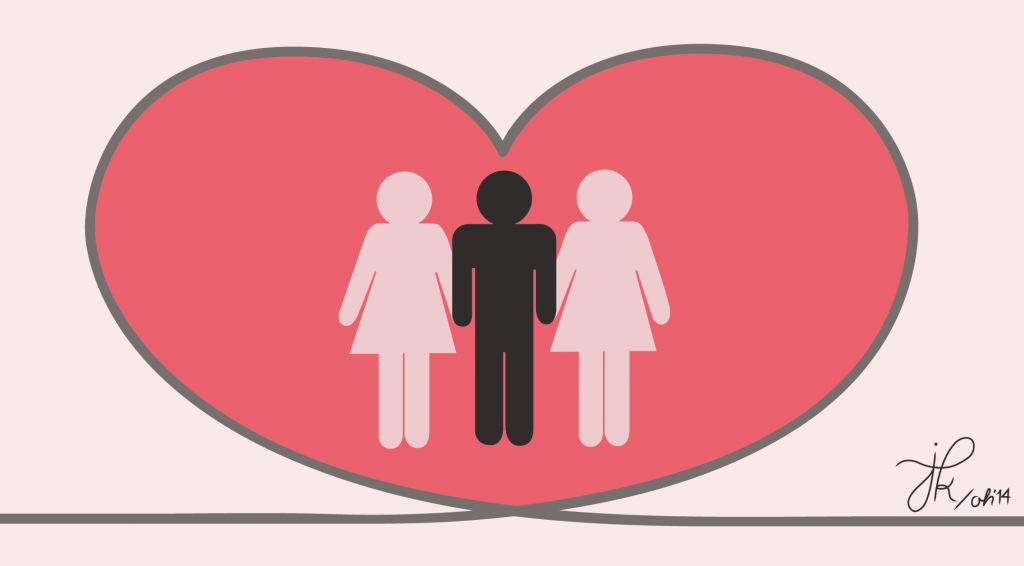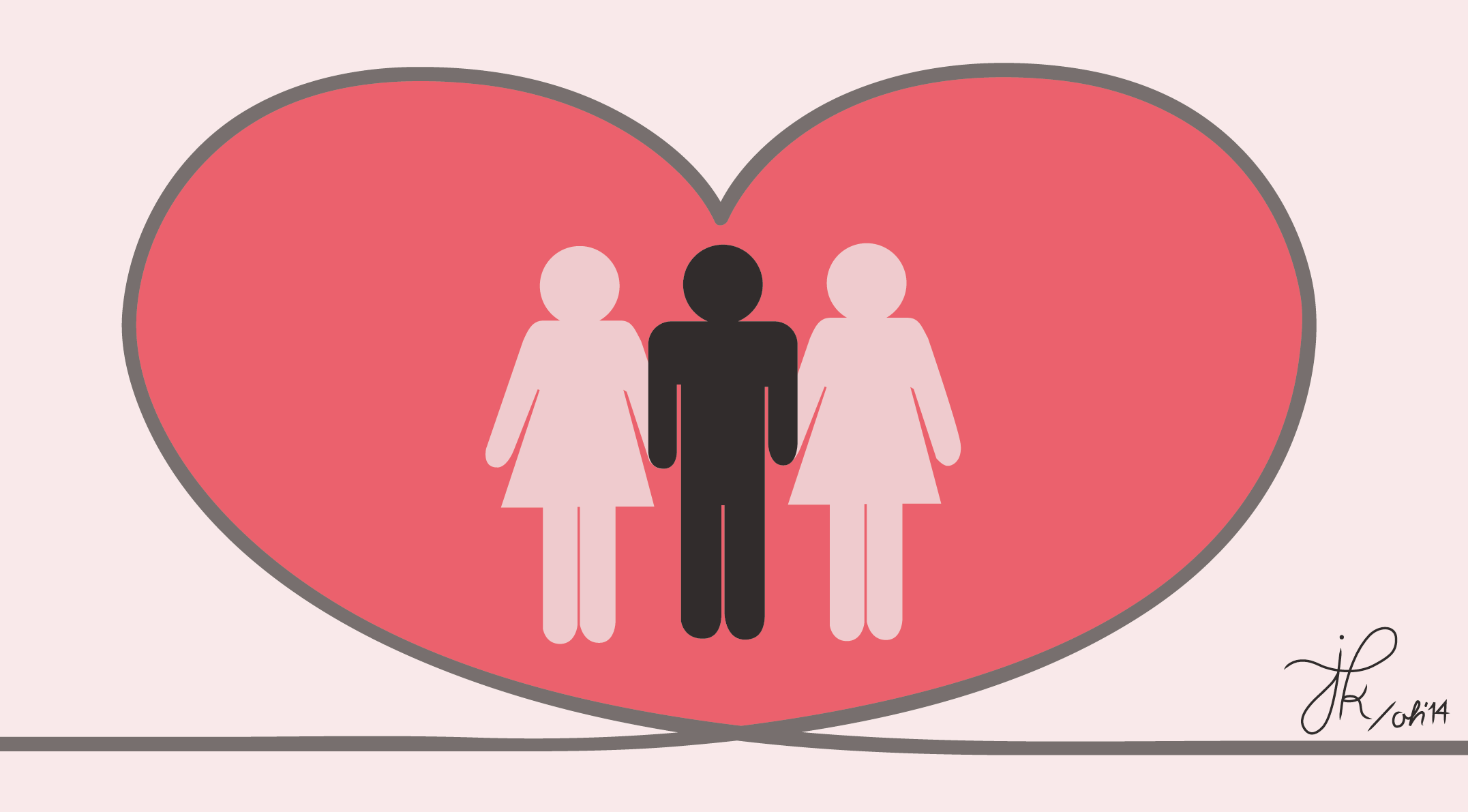
Here’s a joke: a polyamorous couple decide to have a date with their special somebody on Valentine’s Day. By the end of the night, it doubles as an excuse for a house party.
If you don’t get the (admittedly lame) joke, it’s probably because you don’t know what the definition of polyamory is. Unlike swingers, who believe in recreational sex with others and with which polyamorists are often mistaken for, polyamorists are defined by a practice of carrying on multiple emotionally intimate relationships simultaneously. Swingers will sleep with you, but may not love you; polyamorists might just end up sleeping with you and build a deep, long-term commitment to boot. Because of its not-as-prominent profile, polyamory arguably remains even less understood and accepted by society than swinging.
So, to clear the air, The Concordian decided to interview Jocelyn Beaudet, a staff member, Concordia student, and polyamorist himself, to find out the dynamics, both positive and negative, of this often misunderstood lifestyle. What follows is an edited and condensed Q&A.
Q. How do you perceive mainstream views of polyamory, its confusion with swinging, and how do you respond to these views?
Polyamory views are in general very misguided. People have this idea that polyamory and open relationships are the same, when in reality they couldn’t be farther apart.
For starters, polyamory is about maintaining relationships between multiple individuals, without restrictions, and implies no central relationship or hierarchy. Swingers, on the other hand, explore outside of their relationship, in favour of the central union between the two involved parties. In the broad sense, swingers value their central relationships over those they establish outside of their significant others. Polyamorous couples are decentralized, and all involved parties are treated as equals.
Q: Because of the perceived link between monogamy and love, or even the view of love as being exclusively directed to one person at a time, polyamory and other similar lifestyles have been traditionally seen as being excuses for hedonism and selfishness. How would you respond?
The inherent misconceptions of polyamory and polygamy comes from people who don’t like the idea of sharing and they tend to imply that people are forced into this situation. Polyamory in general explores people’s freedom to connect with anyone and generally rely on reaching a position of comfort between parties involved. Not all polyamorous relationships function on the same central basis. Polyamory is a very personal mode of engaging in interpersonal relationships.
Q: How does one exactly navigate through a relationship like that – what are the rules and guidelines?
First, it’s important to note that there are no main partners. Every partner is treated with equal amounts of love and respect. A primary partner is not more important in that aspect. In general, these relationships tend to revolve around other poly-centric individuals. The reason for this mainly involves the monogamous idea of belonging to one another, almost like a form of emotional ownership. This translates poorly and creates jealousy when a partner falls in love with someone else.
The notion of having a primary/secondary is used only as common vocabulary among polyamorous individuals. The idea of a primary is purely defined by account of having spent more time in a relationship with that person.
Imagine being in love with your significant other. That doesn’t negate that you may equally desire someone else. Having this emotional bond with more than one person can be demanding in terms of finding the right emotional balance and being attentive to your partners, but it’s also incredibly rewarding.
Q: How did you come across polyamory, and were there any repercussions for yourself?
My first serious relationship was with a polyamorous woman, and while I was willing to set aside differences (or so I thought at the time) to make things work, I was also very young and prone to jealousy. My initial reaction was negative but as I grew older I ran into a problem where I would constantly fall in love with individuals and jump from relationship to relationship out of fear of hurting anyone. The social consensus was that I was just unable to commit to anyone, and that the guilt I felt for leaving a relationship in favour of another was just reinforcement of that fact.
In reality, this serial monogamy was a result of my refusal to accept that a person can love more than one individual at a time. Since then I’ve had the opportunity to explore polyamorous relationships and, while they’ve been challenging, making not only yourself but other people who you deeply care about incredibly happy, and having a fulfilling relationship with them and them with you, is possibly one of the most enriching experiences in my life.
Make no mistake though, polyamory demands you to be attentive to your partners and tend to their emotional needs as much as they tend to yours, and to keep a constant open line of communication.
Q: What resources are available to polyamorous couples in Montreal, or in general?
Honestly, the only place I can recommend is FetLife.com. Most other dating sites are strongly monogamous. I’m not familiar with many poly-centric communities in the city but I’m pretty sure they exist.
Q: How would you recommend for individuals or couples wishing to explore polyamory to try it out?
The first rule of thumb is to set boundaries. There are many different types of arrangements. For example, you can have asexual polyamory, which implies that a person can date around, but sex may be off the table. Like all things, these rules need to be respected by both parties and an open communication between them needs to exist.
The second important notion is to understand that on a personal level, your potential ‘other’ partner is just as important as your current one. If you begin to create a hierarchy within partners, you move away from the concepts of polyamory and into the concept of the open relationship. Ethical, consensual non-monogamy is the motto of polyamory.
That’s all the questions we can think of for now. Any last words?
Much love!




